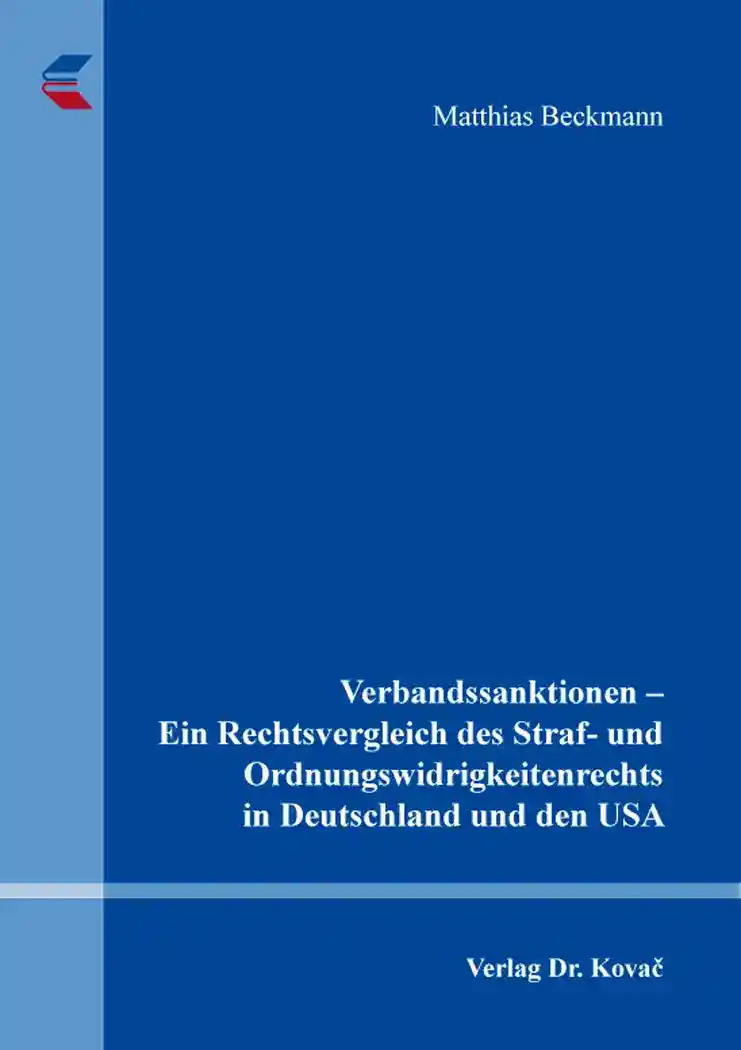Matthias BeckmannVerbandssanktionen – Ein Rechtsvergleich des Straf- und Ordnungswidrigkeitenrechts in Deutschland und den USA
Schriftenreihe zum internationalen Einheitsrecht und zur Rechtsvergleichung, volume 68
Hamburg 2021, 228 pages
ISBN 978-3-339-12424-1 (print) |ISBN 978-3-339-12425-8 (eBook)
About this book deutschenglish
German criminal law does not yet recognize the criminal liability of corporations. Corporations are usually sanctioned by way of fines within the meaning of section 30 of the German Administrative Offences Act (Ordnungswidrigkeitengesetz). In accordance with the principle of culpability, any form of criminal liability presupposes the individual’s own responsibility („nulla poena sine culpa“). According to the Federal Constitutional Court (Bundesverfassungsgericht), this principle is anchored in the rule of law principle of Article 20 (3) as well as in the principle of human dignity in the sense of Article 1 (1) of the German Constitution (Grundgesetz) and is thus part of the constitutional identity.
In the USA, on the other hand, there is genuine corporate criminal law. The criminal act of an employee is attributed to the association as its own criminal act. In addition to monetary fines, the court can for example enforce „imprisonment“ against the association by appointing a sovereign officer or restrict the scope of permissible business activities. If an association is classified as a criminal organization, its dissolution is possible by deprivation of its assets. Further types of sanctions apply. The subject of the U.S. part of the thesis is U.S. federal law. Accordingly, a corporation’s sanction is determined in light of the Federal Sentencing Guidelines. These establish uniform sentencing principles. The thesis shows to what extent the almost mathematical calculation method of the Federal Sentencing Guidelines provides greater legal certainty for corporations. It also explains the role these principles have played in sentencing since the U.S. Supreme Court’s 2005 decision in United States v. Booker.
Compliance programs and the association’s cooperation with law enforcement authorities as well as internal investigations can lead to a reduction in the penalty of up to 95 percent. The thesis presents the requirements for compliance programs, cooperation measures and internal investigations in this sense according to the Federal Sentencing Guidelines as well as the guidelines of the U.S. Department of Justice.
In Germany, the draft of an Association Sanctions Act is currently in the legislative process. The paper presents the extent to which the introduction of the law would bring German law closer to U.S. law with respect to the sanctioning of corporations and, also against this background, shows the similarities and differences between the two legal systems.
Link des Autors
Keywords
ComplianceCompliance-MonitorCompliance-ProgrammeDeutschlandRechtsvergleichungSanktionenrechtStrafrechtStrafzumessungU.S.-RechtUnited States Federal Sentencing GuidelinesUnited States Sentencing CommissionUSAVerbandsgeldbußeVerbandssanktionenVerbandssanktionengesetzIhr Werk im Verlag Dr. Kovač

Möchten Sie Ihre wissenschaftliche Arbeit publizieren? Erfahren Sie mehr über unsere günstigen Konditionen und unseren Service für Autorinnen und Autoren.
